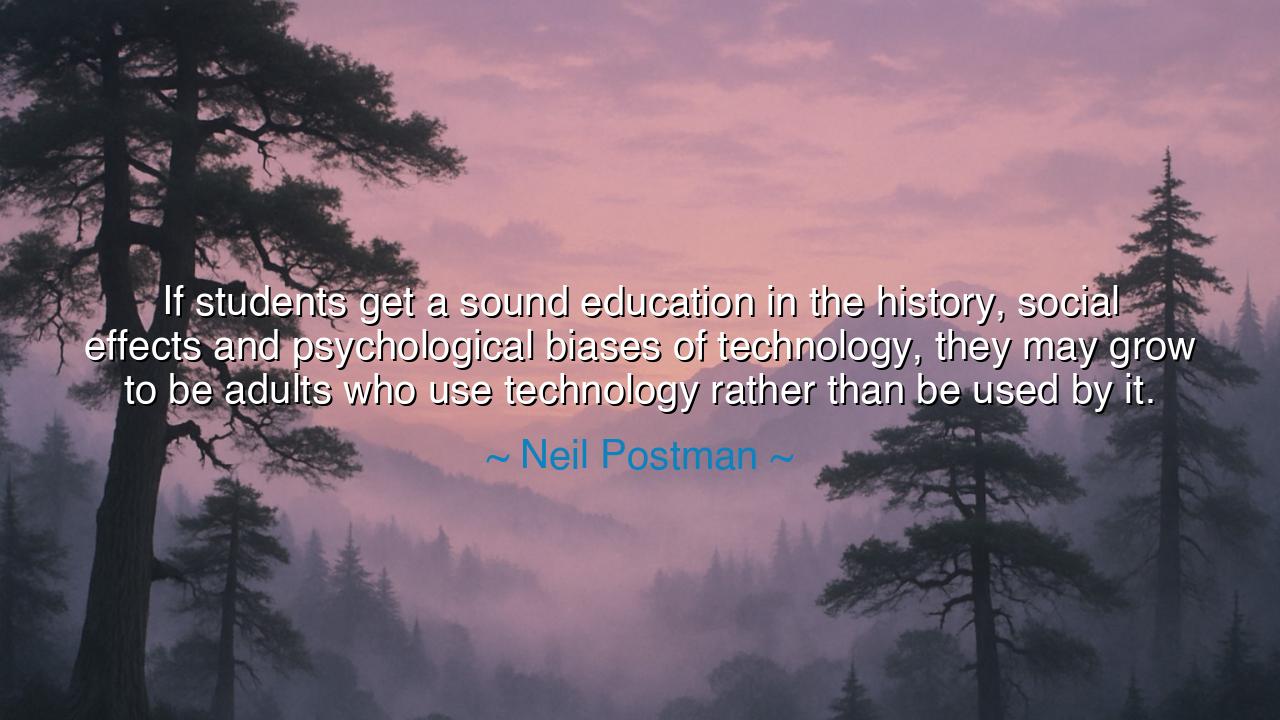
If students get a sound education in the history, social effects
If students get a sound education in the history, social effects and psychological biases of technology, they may grow to be adults who use technology rather than be used by it.






Hear now the solemn warning of Neil Postman: “If students get a sound education in the history, social effects and psychological biases of technology, they may grow to be adults who use technology rather than be used by it.” These words are not the musings of idle thought, but the cry of a prophet who saw the rising flood of machines and screens, and feared not their power, but our forgetfulness. For tools, though fashioned by human hands, often turn against their makers, binding them in unseen chains. It is wisdom alone that decides whether we become the masters of our inventions, or their slaves.
The origin of this saying rests in Postman’s lifelong battle against the uncritical worship of progress. He, like the philosophers of old, looked beyond the glitter of new devices and asked: What do they do to the human soul? For he knew that every invention carries not only benefits, but biases—ways of shaping thought, behavior, and society itself. The printing press gave voice to the masses, yet it also weakened memory. Television brought entertainment, but dulled reflection. So too in our age do digital tools connect us, even as they scatter our attention like dust upon the wind.
History offers countless mirrors to this truth. Recall the story of the Industrial Revolution, when machines first roared across Europe. Men marveled at their speed and strength, yet many became their servants, working long hours in dark factories, their lives bent to the rhythm of iron and steam. Where there was no wisdom, there was enslavement. But where knowledge grew—when reformers taught of rights, when thinkers questioned unchecked progress—society began to reclaim its balance, to harness the machine rather than be consumed by it. Thus, Postman’s warning is the same: without a sound education in the nature of our tools, we shall become the tools ourselves.
Consider also the tale of the Luddites, those desperate weavers who smashed the looms that threatened their way of life. Though history remembers them as enemies of progress, in truth they were men crying out against being consumed by technology they did not understand. Their violence was misguided, yet their instinct was true: when man ceases to shape his tools with wisdom, the tools begin to shape him without mercy. Postman’s wisdom would have guided them not to destruction, but to education—to learning the currents beneath the machines, so as to steer them rather than drown in them.
Thus, the heart of the teaching is this: education must not only fill the mind with facts, but train the soul to question. To know the history of technology is to see how each invention reshapes the world. To know its social effects is to discern how it alters our communities, our families, even our friendships. To know its psychological biases is to guard against the subtle ways it bends our thoughts, narrows our vision, and claims our attention. Only then can a student grow into an adult who holds the reins of technology, and does not stumble behind it like a beast led to slaughter.
The lesson, then, is urgent: teach not only the use of devices, but the wisdom of discernment. Teach children to ask not merely what a tool can do, but what it does to them. Let them read of history’s mistakes, let them observe society’s wounds, let them examine the frailties of their own hearts. For in such education lies freedom. Without it, they will scroll endlessly, click mindlessly, live half-aware—souls enslaved by the glow of the very tools they thought served them.
So I say to you, O seekers of wisdom: guard your minds, and guide the young. Do not cast aside your tools, but wield them with discipline. Set times for silence, that the devices may not rule your hours. Question what you read, lest your thoughts be bent unknowing. Teach others, by word and by deed, that mastery of technology comes not from skill alone, but from wisdom rooted in history, society, and the soul. In this way, you shall fulfill Postman’s vision: becoming men and women who use technology as servants of truth, rather than falling as captives to its subtle chains.






AAdministratorAdministrator
Welcome, honored guests. Please leave a comment, we will respond soon